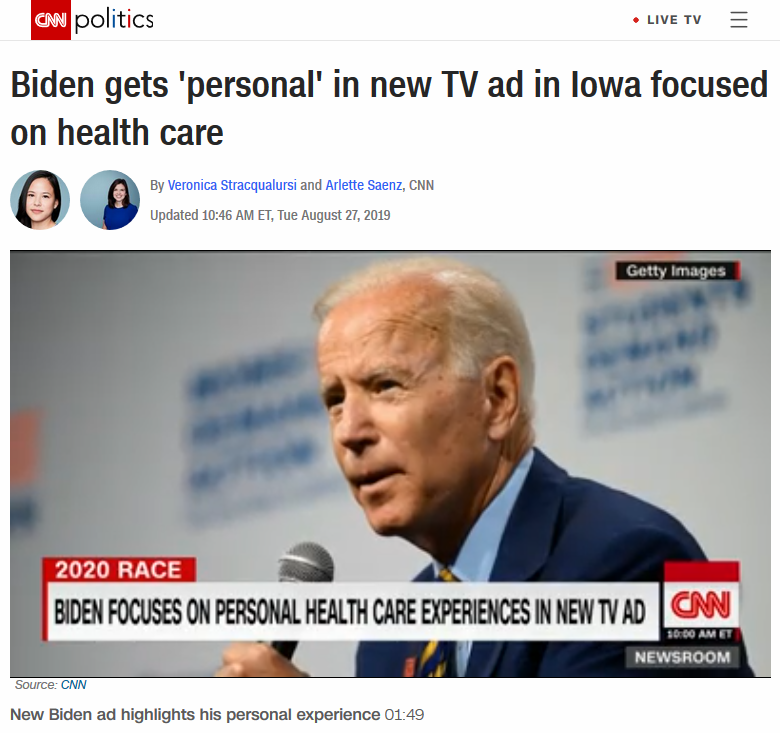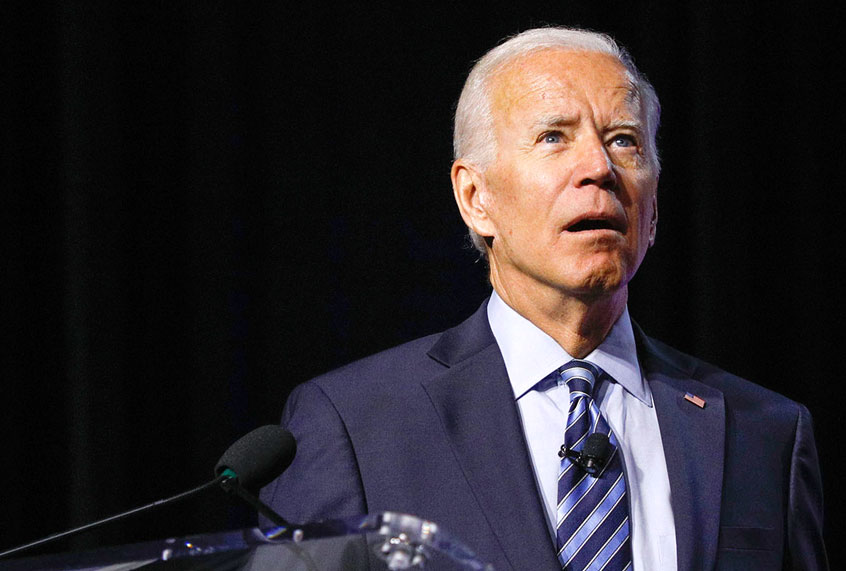Democratic presidential candidate Joe Biden last month released a new Iowa TV ad called “Personal,” which recounts the former vice president’s personal tragedy of losing his wife and daughter to a car crash, and the subsequent loss of his son Beau Biden from brain cancer.
Biden presented his story as a celebration of for-profit health insurance by saying that he “couldn’t imagine” what it would’ve been like if their insurance didn’t cover the health care required “immediately,” and that he couldn’t “fathom” what would’ve happened if the insurance companies had said for the last six months of his son’s life, “You’re on your own.”
The advertisement continued Biden’s practice of dishonestly conflating Republicans who want to repeal the Affordable Care Act — also known as Obamacare — with those advocating a national health insurance program like most developed countries have. He mentions in the same breath Donald Trump’s efforts to repeal the ACA and proposals for a Medicare for All system, as advocated by rival primary contenders like Bernie Sanders and Elizabeth Warren:
Health care is personal to me. Obamacare is personal to me. When I see the president try to tear it down, and others propose to replace it and start over. That’s personal to me too. We’ve got to build on what we did because every American deserves affordable health care.
Corporate media uncritically transmitted the ad’s message as if it were merely a campaign strategy, instead of explaining what Biden, Sanders and Warren’s proposals actually are, and clarifying for voters whether Biden’s charges against his primary opponents are accurate.

CNN (8/27/19) does not question why, if the lesson of his personal experience is that “every American deserves affordable healthcare,” Biden supports a policy that would continue to leave millions without health insurance.
CNN’s report (8/27/19), “Biden Gets ‘Personal’ in New TV Ad in Iowa Focused on Healthcare,” mainly noted that Biden’s new ad
highlights his continued support for the Affordable Care Act, at a time when other progressive Democratic candidates are pushing for a “Medicare for All” approach.
CNN also falsely asserted that Medicare for All advocates are proposing to enroll everyone in a national health insurance program and “eliminate” private health insurance. In fact, no Medicare for All proponent supports banning private health insurance. For example, Sanders’ Senate bill — which is co-sponsored by other candidates like Cory Booker, Kamala Harris and Elizabeth Warren — bans private health coverage that duplicates the coverage offered by the government, because it would be rendered obsolete, and still allows for supplemental private coverage (The Week, 7/3/19).
The Washington Post’s “Biden Knocks Trump, Democratic Rivals in New TV Ad Touting Affordable Care Act” (8/27/19) trivialized the issue of health care by covering Biden’s ad in terms of the political horserace, emphasizing the role it plays in his campaign strategy — rather than explaining the differences between the various candidates’ proposals. The Post’s John Wagner merely notes that Biden’s ad “knocks both President Trump and some of his Democratic hopefuls” and “suggests they are all a threat to the Affordable Care Act.”
The Hill (8/27/19) continued the Post’s horse race-focused coverage, noting that Biden’s ad “appears to hit Biden’s 2020 rivals for proposing ideas to replace Obamacare,” and that it “illustrates the Biden campaign’s latest effort to tie the former vice president to the Obama administration.”
CBS (8/27/19) framed Biden’s ad as “an emotional appeal to Iowa caucus voters” and mentioned his proposal to add a public option, while uncritically transmitting Biden’s false assertion that his “Democratic rivals” want to “scrap the law and start over,” which Biden has slammed as “unrealistic.”

The New York Times (8/27/19) says Biden’s ad “reminds voters of the good will and empathy many have for the former vice president while accentuating one of his central policy goals” — though the Times fails to explain what that goal is.
The New York Times’ report, “Why This Joe Biden Health Care Ad Stands Out” (8/27/19), stood out for its bad reporting, functioning essentially as an advertisement for the advertisement. The Times’ Katie Glueck described the ad as an “extraordinarily emotional appeal” for Biden’s candidacy and his health care proposal, describing it as being “striking” for its “wrenching images,” and mentioning how some voters have cited Biden’s “ability to connect with people after facing so much personal adversity of his own” to explain their support. The Times never mentions what Biden’s health care proposal actually is — perhaps because the ad itself doesn’t do so.
Instead, the Times reported on Warren’s rising poll numbers in Iowa and how “emphasizing his partnership with Mr. Obama” has “been a central strategy in Mr. Biden’s campaign.” The piece claimed that Biden has “not always been comfortable” using the deaths of family members for political purposes, because it would tread on “sacred ground,” but this hesitation now appears to be gone.
But when reports on Biden’s “Personal” ad observe that it is an “oblique” attack against Sanders and Warren’s Medicare for All proposals, they have a journalistic obligation to investigate whether or not these attacks are true.
Corporate media have shown they have no problem devoting attention to tracking other falsehoods Biden has told on the campaign trail, like when he offered “my word as a Biden” that a false war anecdote was “the God’s truth” (Washington Post, 8/29/19). Perhaps this is because telling lies about Medicare for All protects insurance industry profits (FAIR.org, 4/29/19), which are not threatened by the exposure of fake war stories?
Others have already documented the numerous falsehoods Biden has told about Medicare for All, among them the notion that Medicare for All advocates are trying to “scrap Obamacare” and cause a “hiatus” or a lapse in coverage for up to three years (Jacobin, 7/18/19). Medicare for All advocates don’t support repealing the ACA or creating a lapse in coverage; Sanders’ bill in particular has a four-year transition period in which Medicare is continually expanded to cover everyone (Common Dreams, 7/15/19).

Vice‘s Tim Marchman (8/27/19) suggests Biden “wants people to think that implementing Medicare for All would involve blowing up the healthcare system as it stands and leaving people with no health insurance for some period.”
While horse-race coverage predominated, some exceptional reports attempted to gauge the accuracy of Biden’s attacks on Medicare for All proponents by explaining their proposals. CNBC (7/15/19) explained that Medicare for All wouldn’t “do away with the ACA in the same way that repeal of the ACA would,” and noted that Sanders’ legislation would create a “more comprehensive government-run system” that would include dental, vision and mental health services, while eliminating deductibles and co-pays. Vice News’ “Joe Biden: It Would Be An Insult to My Dead Son for Everyone to Have Healthcare” (8/27/19) offered an excellent breakdown of Biden’s ad and its falsehoods:
In all, the ad is saying that healthcare is personal to Joe Biden because his son died; that as a father, he believes the best and most legitimate way to honor his dead son’s legacy would be to implement further incremental regulatory reform, along the lines of what Barack Obama did; and that people who disagree and think that radical reform is necessary — among them, presumably, the 80% or so of Democrats who say it’s important to nominate a presidential candidate who supports Medicare for All — are dishonoring his son’s legacy.
If Joe Biden wants to get personal, I can also get very personal. Before my mother passed away last month, following an amputation for bone cancer, I was caring for and accompanying her to many doctors’ appointments, and I recall the numerous times my mother was rejected from hospitals for not having the proper insurance, along with delays, redundant tests and the frequent anxiety of wondering whether her insurance would cover her treatment — because we don’t live in a country where health care is a human right.
People can use personal tragedies as justification for perpetuating and inflicting injustices on others, and they can also use those tragedies as inspiration and motivation to prevent others from going through the same hardships. Biden’s latest ad is an example of the former masquerading as the latter, and corporate media’s coverage of it exemplifies how some personal tragedies are amplified and others neglected to protect corporate profits.


